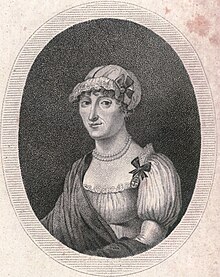Tekla Teresa Lubienska
| Tekla Teresa Łubieńska | |
|---|---|

Countess Tekla Teresa Łubieńska, c.1800
|
|
| Born | Tekla Teresa Bielińska 6 June 1767 Warsaw Poland |
| Died | 15 August 1810 (aged 43) Kraków, Congress Poland, |
| Occupation | Writer, dramatist, translator |
| Nationality | Polish |
| Genre | Fiction, dramatic fiction, Lyrical poetry, translations of Jean Racine and Voltaire |
| Notable works | 'Charlemagne and Wedekind' |
| Spouse | Count Feliks Walezejusz Łubieński |
| Children | Franciszek, Tomasz Lubienski, Henryk, Tadeusz, Julian, Jan, Józef, Maria, Paulina, Rozalia |
Tekla Teresa Łubieńska (born 6 June 1767 in Warsaw, died 15 August 1810 in Kraków) – was a Polish playwright, poet and translator.
She was the daughter of Polish nobles, Franciszek Bieliński, (nephew and adopted son of Franciszek Bieliński), Court writer and senator for Czersk and his wife, Krystyna Justyna Sanguszko. She was taught at home. At age of 11 in 1877 she lost her mother. From then on, she was in the care of the duchess, Barbara Sanguszko, her maternal grandmother who gave her a French education. She later married, as his second wife, Feliks Łubieński, a future Minister of Justice in Congress Poland. They had ten children, among them, Tomasz Lubienski, While Tekla's husband was involved in the turbulent politics of the Targowica Confederation, she left for Prague with her children. On her return to Poland in 1785, she settled in the family estate in Guzow (Zyrardow County) and devoted herself to family life and her writing. She died suddenly at the early age of just 43, in Kraków in August 1810. She is an ancestor of British actor, Rula Lenska.
At the time of the Four-Year Sejm she wrote patriotic verse. Initially, she devoted herself to writing chiefly comedies, including dramatic diversions for children. She later produced historical dramas such as: Wanda, queen of Poland (1806), Charlemagne and Wedekind (1807), a two-act drama in verse. She translated works by Jean Racine and Voltaire.
...
Wikipedia
